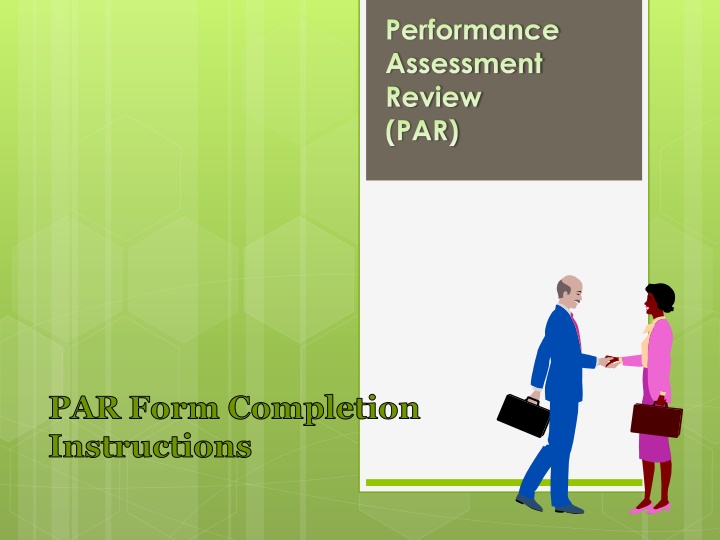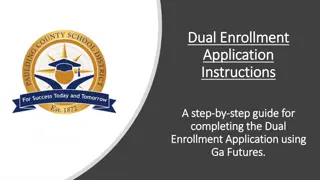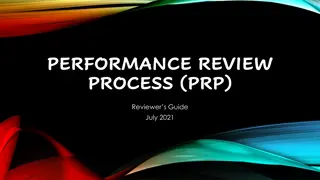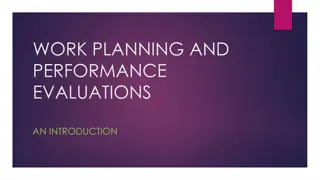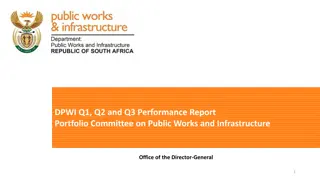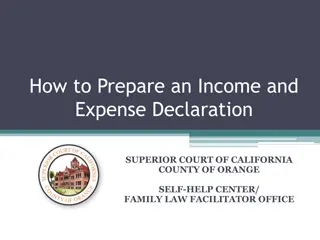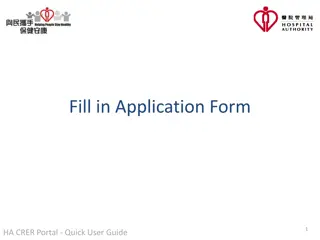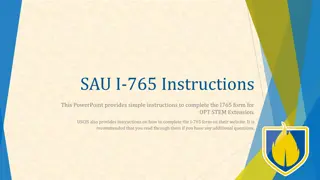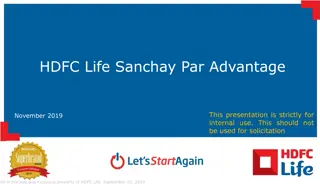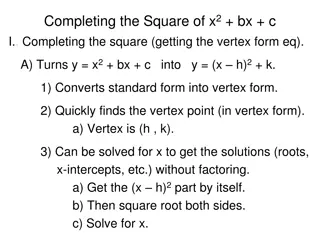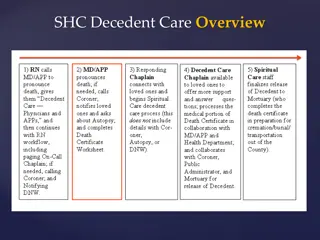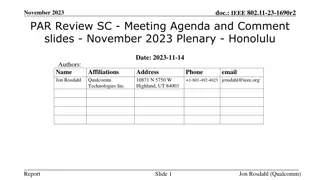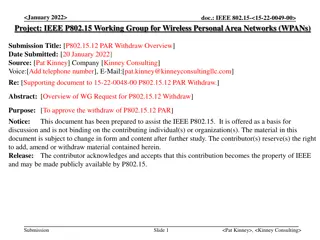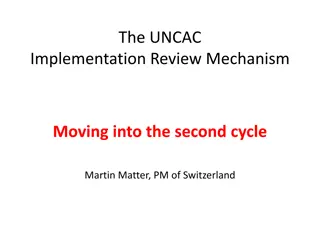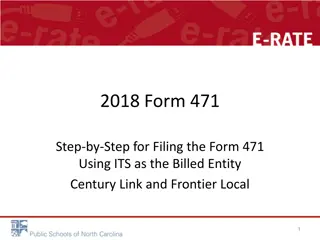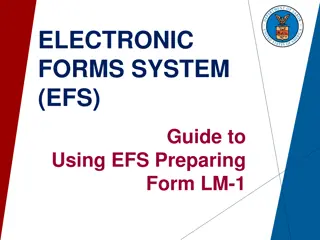Completing Performance Assessment Review (PAR) Form: Step-by-Step Guide
This presentation provides a comprehensive walkthrough on completing the PAR form, offering blank samples, discussions, and completed examples of each section. It includes guidance on job expectations, appraisal process overview, participant roles, and job expectations conference details.
Download Presentation

Please find below an Image/Link to download the presentation.
The content on the website is provided AS IS for your information and personal use only. It may not be sold, licensed, or shared on other websites without obtaining consent from the author.If you encounter any issues during the download, it is possible that the publisher has removed the file from their server.
You are allowed to download the files provided on this website for personal or commercial use, subject to the condition that they are used lawfully. All files are the property of their respective owners.
The content on the website is provided AS IS for your information and personal use only. It may not be sold, licensed, or shared on other websites without obtaining consent from the author.
E N D
Presentation Transcript
Performance Assessment Review (PAR) PAR Form Completion Instructions
Performance Assessment Review This presentation will take you step by step through the process of completing the PAR form which is available on line in a fillable format The format of this presentation will consist of a: Blank sample of each section of the form Brief discussion of each section of the PAR form Completed example of each section of the form 2
Getting Started It may be helpful for you to have a hard copy of YOUR Organization s PAR form available as you proceed through this presentation since forms will vary slightly from organization to organization At the end of the presentation, there is a Tip Sheet that may also be beneficial to you in completing the PAR form 3
Any Good Performance System Must: Link performance to Core Mission Areas, Goals, and Strategies Tie individual results to program results Measure individual results Enable skill development and job enrichment Mission and Goals Individual Results Program Results 4
Overview of the PAR Appraisal Process Job Expectations Agreement What the job is How well it is to be done? Interim Assessment How well was it done during the first six months of the cycle? Final Assessment How well was it done throughout the entire cycle? 5
Participants in the PAR Process Ratee: Employee being rated Rater: Immediate supervisor who receives and/or dispenses the work Reviewer: Rater s supervisor or manager. Role is to check for consistency. Responsible for setting goals and expectations for unit/division 6
Job Expectations Conference Job Expectations Review Core Mission Areas & Department Mission Statement Outline Major Goals for Unit Establish Major Ratee Goals Determine Major Job Responsibilities Set Specific, Measurable Essential Criteria Review pre-defined Performance Factors selected by agency and discuss their application 7
Job Expectations Major Goals of the Unit/Work Group Major Goals of Ratee Signatures Acknowledgment of PAR elements Confirmation of meeting Agree/Disagree Acknowledgment of Ratee s position Ratee Comments 8
Job Expectations: Major Goals of Unit/Work Group Governor s Predefined Core Mission Areas that relate to your organization Goals of the organization Division s purpose Work Unit or Group s overall purpose as it relates to/supports the overall Core Mission of the organization 9
Job Expectations Major Goals of the Ratee Identifies the individual goals of the ratee that support the work unit s purpose(s) The major goals of the Ratee should be identified, communicated and discussed at the Job Expectations Agreement session 10
Certification of Job Expectations Agreement During Initial Meeting/After the Entire PAR is Discussed: Job Expectations are discussed and clearly explained Date that the face to face meeting was held After any revisions/comments, both rater & ratee sign & date PAR form Ratee checks either agree or disagree PAR is then forwarded to the reviewer *NOTE: We will return to the Certification of Job Expectations Agreement section after review of Sections 1, 2, & 3 11
Job Expectations also includes: Major Job Responsibilities Essential Criteria 12
Major Job Responsibilities What are they? Generally 6-10 broad duties, tasks or responsibilities which must be accomplished to achieve the unit s goal. 13
Major Job Responsibilities Should: Contribute to the Goals and Objectives Be Critical to the job Require a significant amount of Time Include any that are Required by Statute or Regulation Be Done Often Accurately reflect the Actual Work over which employee has control (responsibility, authority and resources to act) 14
Essential Criteria What are they? Essential Criteria are statements of conditions that exist when a job responsibility has been completed successfully How many are required? At least one (1) Essential Criteria for every Major Job Responsibility 15
Principles of Essential Criteria Specific Measurable Attainable Reasonable Time Related 16
Performance Factors: Purpose Align Core Mission Areas, agency goals and objectives with performance Provide a uniform guide for evaluating performance Predefined by the organization 17
Performance Factors Job Achievement Factors Job Related Factors *Refer to the hard copy of your organization s PAR so you know which factors your organization has chosen 18
Section 2: Performance Factors Job Achievement Factors These factors are directly related to the output of the job: Section 1 - Major Goals, Job Responsibility, and Essential Criteria The Organization predetermines Job Achievement Factors 19
Section 2: Performance Factors Job Related Factors These global factors support the Core Values of the organization and expected performance of the job The Organization predetermines Job Related Factors 20
Section 3: Computation & Conversion to Overall Rating 1. Subtotals of Job Achievement and Job Related Performance Factors are added to determine Grand Total points 2. Grand Total points are converted to the Overall Evaluation Rating. For example: 09-13 points = Unsatisfactory Final Rating (1) 14-22 points = Successful 23-27 points = Exceptional *NOTE: Point values will vary by organization depending upon the number of Job Performance Factors each organization selects Final Rating (2) Final Rating (3) 21
Performance Factors: Rating Mechanism Job Achievement Job Related 1. Review written descriptors against Ratee s Goals, Job Responsibilities, and Essential Criteria 2. Determine evaluation points for each factor 3. Subtotal points 1. Review written descriptors against Ratee s Overall Performance 2. Determine evaluation points for each factor 3. Subtotal points 22
Ratings are done on a 3-point scale 1. Unsatisfactory - Failed to achieve most essential criteria. Rarely met work schedules or performance criteria 2. Successful - Met or occasionally exceeded essential criteria. Produced acceptable or greater amounts of work 3. Exceptional - Significantly exceeded essential criteria consistently in a sustained job performance 23
Job Expectations are written at the Successful level Justifications should be written for all ratings If the Ratee s performance is at the Exceptional or Unsatisfactory level, the Rater should prepare specific documentation to support those ratings We will discuss this again later in the presentation *NOTE: At this point in the PAR Review, all of the expectations of the ratee have been discussed with the employee. Now is when the ratee and rater will sign the Certification in Section 1 Job Expectations 24
Sections 4 & 5: Interim and Final Justification Sheet and Development Plan Section 4 & 5 are identical with the exception of the time periods they cover: Interim = First 6 months Final = Entire 12 months 25
Interim and Final Evaluation Conferences Determine evaluation points and rating justification; Recognize and document positive contributions and areas needing improvement Determine job performance gaps and action plan to close gaps Mutually develop action plan for development and improvement Mutually establish specific deadlines for improvement Set follow-up meeting if necessary Interim Rating covers the 1st six months Final Rating covers the ENTIRE year 26
Justification Sheet Justification Recognize and document positive contributions, as well as areas needing improvement Provide justification for the overall Rating Cite specific examples of performance that support an Exceptional or Unsatisfactory Rating 27
Justification: Do s andDon ts DO: DON T: Give reasons, both positive and negative, that substantiate the rating Repeat the rating term and think that this is sufficient evidence: e.g. Joan s performance is Commendable Review the Fact Sheet of Significant Events which will be reviewed shortly, and any other documentation in preparing the justification Include issues that are not related to the performance of the job 28
Development Plan Specific Area(s) Identified for Development Identify skills and competencies targeted for improvement Focus on improvement in order of importance Mutually develop a plan of action Include resources needed, obstacles, and alternatives 29
Development Plan Specific Action to be Taken by Ratee Actions may include: Take on special projects or assignments Attend classroom training courses Utilize Online Training (LMS) Perform library research or other relevant readings Work with a peer or closely with a Manager Attend seminars and workshops 30 Enroll in local and national professional organizations
Section 6: Fact Sheet of Significant Performance Events 31
Fact Sheet of Significant Performance Events Used to record any noteworthy event, positive or negative, that occurs throughout the rating cycle Any Significant Event that represents performance below or above the Successful level should be recorded Events should be documented as they occur, with both rater and ratee initialing the documentation All involved parties are encouraged to request entries on the form; Rater determines significance 33
SAMPLE 34
Certification of Interim and Final Evaluations Review & discuss Sections 1, 2, 3 and 4. Rating, Justification and Development Plan. Date the face to face meeting was held After any revisions/comments, both rater & ratee sign & date PAR form Ratee checks each of 3 boxes with either agree or disagree PAR is then forwarded to the reviewer 35
Tip Sheet You should save the PDF immediately once you start working within the form. Save in your documents: File>Save As>PDF Recommended naming convention: 2013 PAR_ employeename . Example: 2013 PAR_Joan West To check spelling within the form: Go to Edit>Check Spelling>In Comments, Fields & Editable Text Or Use key command F7 If you want to email the PDF you can do so from within Adobe Reader: File>Attach to Email. A panel will open on the right hand side. Select Attach to Email and press Attach button and outlook will open with the PDF attached. The form is designed to allow the user to type in the Ratee s name, Title, Rating Period, Rater, and Department/Agency-Location one time then it will auto populate on every page. The form calculates the Job Achievement Subtotal and Job Related Subtotal for the user. Also once the Interim Evaluation Rating and Final Evaluation Rating is keyed into the Conversion to Overall Rating, the rating is placed onto the Justification Sheet and Development Plan. 36
Thank you for your participation! If you have any further questions or concerns regarding PAR, please contact your PAR Coordinator or Human Resource Manager. The Civil Service Commission will have further PAR training opportunities at the request of the agency 37
